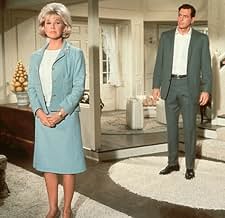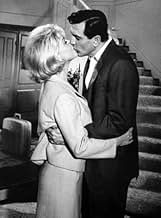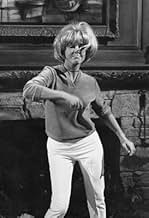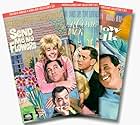CALIFICACIÓN DE IMDb
6.9/10
7.8 k
TU CALIFICACIÓN
Un hombre hipocondríaco cree que se está muriendo y prepara un plan para su esposa. Esta lo encuentra y lo malinterpreta.Un hombre hipocondríaco cree que se está muriendo y prepara un plan para su esposa. Esta lo encuentra y lo malinterpreta.Un hombre hipocondríaco cree que se está muriendo y prepara un plan para su esposa. Esta lo encuentra y lo malinterpreta.
- Dirección
- Guionistas
- Elenco
- Premios
- 1 premio ganado y 1 nominación en total
John Alban
- Commuter
- (sin créditos)
Don Anderson
- Country Club Member
- (sin créditos)
Shirley Anthony
- Country Club Member
- (sin créditos)
Herschel Bernardi
- TV Announcer
- (voz)
- (sin créditos)
Paul Bradley
- Country Club Member
- (sin créditos)
- Dirección
- Guionistas
- Todo el elenco y el equipo
- Producción, taquilla y más en IMDbPro
Opiniones destacadas
The main character is dying, but not the movie! It shall live forever. This is one of five golden, grown-up comedy classics Doris Day starred in, the others being "Teacher's Pet", "Pillow Talk", "That Touch of Mink" and "Lover Come Back". Of course, Hollywood never gives an Oscar for comedy. Drama is deemed deep! Nothing is deeper than comedy. Actually, drama is often unintentional comedy.
The critics disliked the movie because the subject is grim: terminal illness, or fear thereof. But if you take that attitude, nothing at all is funny. Actually, death is just the theme around which a lot of variations about modern life are spun. This film is masterful in every respect, a real treat. Paul Lynde is priceless as the effeminate undertaker. Doris Day is a miracle. Even the theme song is a thrill. Oh, why did we stop making these clean, domestic movies dealing with practical issues and everyday life?
The critics disliked the movie because the subject is grim: terminal illness, or fear thereof. But if you take that attitude, nothing at all is funny. Actually, death is just the theme around which a lot of variations about modern life are spun. This film is masterful in every respect, a real treat. Paul Lynde is priceless as the effeminate undertaker. Doris Day is a miracle. Even the theme song is a thrill. Oh, why did we stop making these clean, domestic movies dealing with practical issues and everyday life?
Admittedly, I would have never seen a Rock Hudson picture if I hadn't seen a clip from this movie of Hudson in a wheelchair rolling out his backdoor, bouncing off a mattress and rolling back into Doris Day on "The Beverly Hillbillies." Determined to see the whole of this movie based on that one funny scene, I got myself a copy of this movie and loved it ! Hudson plays a hypochondriac who mistakenly believes he is dying. Trying to set up his wife played by Doris Day for after he is gone, he sets off one horrendous fight that looks like a comic version of "War of the Roses." Tony Randall has the Danny DeVito role in this comedy that also stars Paul Lynde in one of his best roles next to Uncle Arthur on "Bewitched" and Edward Andrews, a great actor of the Sixties whose first name is almost an anagram of his last. The movie is fast, furious and enjoyable, but mildly dated for it's times. While the times may have changed, the humor basicly has stayed the same.
While not terribly well received here on IMDb, this is in my opinion the best of the three Hudson/Day/Randall teamings. While Pillow Talk remains fresh and sharp fifty years later (with Lover Come Back being a rather unfortunate and less enjoyable recycling of the same script), it is Send Me No Flowers that gets the most air-play of the three in our home video library.
From the superb opening theme song performed by Doris Day, we are transported into the beautiful suburbia of yesteryear. Rock Hudson's George Kimball is absolutely hilarious as the king of all hypochondriacs (if you've ever known such a person, you'll die laughing). And for 1964 it makes some rather amusing and insightful observations into the nature of medicinal advertising. Ms. Day plays wife Judy Kimball; she is a delight as always and it's perhaps the most satisfying aspect of the screenplay that at last Hudson and Day are married and thus involved in a relationship that extends beyond never-realized innuendo. Randall plays the usual right-next-door character attached to Hudson's, Arnold Nash, and again this is the best of the virtually identical characters he plays in the three movies they made together.
Being the hypochondriac that he is, Kimball misinterprets a conversation he overhears at the doctor's office and subsequently believes he is dying. Once he and his accomplice Arnold absorb the blow, they set about to find a suitable replacement husband for Judy to marry once George is gone. It's really a rather touchingly honorable intention and also generates the bulk of the misunderstandings that constitute the remainder of the film.
There are some negatives, these are things we see through our 21st century eyes and were certainly never intended to be offensive at the time. These mainly revolve around Day's character; Judy Kimball is a beautiful and intelligent woman, but is given no other pastimes in the entire course of the film other than playing golf and preparing her husband's breakfast. And despite being beautiful and intelligent, George apparently considers her to be too big of an idiot to ever possibly survive without him, and thus he must find a man to take care of her once he is gone. She has no children, no occupation, doesn't understand a mortgage, can't write a check to the gas station correctly, her greatest interest is in the impending divorce of a neighbor she doesn't even know and she apparently doesn't even know what she pays for groceries. We are clearly shown George's greatest dread as he imagines a number of scenarios in which Judy evidently has no judgment whatsoever and is easy prey to any slick con artist that should come along once she is widowed. It might also be said that this is absolutely typical of the way virtually all women are depicted in movies and television of this era.
Like all three of the Hudson/Day/Randall comedies, this one is lush and colorful, with exquisite sets and wardrobe. The supporting cast are excellent, particularly Paul Lynde as the cemetery proprietor and Edward Andrews as Kimball's exasperated physician. This film carries a warm, comfortable feel of a happier bygone era and packs lots of laughs. Highly recommended.
From the superb opening theme song performed by Doris Day, we are transported into the beautiful suburbia of yesteryear. Rock Hudson's George Kimball is absolutely hilarious as the king of all hypochondriacs (if you've ever known such a person, you'll die laughing). And for 1964 it makes some rather amusing and insightful observations into the nature of medicinal advertising. Ms. Day plays wife Judy Kimball; she is a delight as always and it's perhaps the most satisfying aspect of the screenplay that at last Hudson and Day are married and thus involved in a relationship that extends beyond never-realized innuendo. Randall plays the usual right-next-door character attached to Hudson's, Arnold Nash, and again this is the best of the virtually identical characters he plays in the three movies they made together.
Being the hypochondriac that he is, Kimball misinterprets a conversation he overhears at the doctor's office and subsequently believes he is dying. Once he and his accomplice Arnold absorb the blow, they set about to find a suitable replacement husband for Judy to marry once George is gone. It's really a rather touchingly honorable intention and also generates the bulk of the misunderstandings that constitute the remainder of the film.
There are some negatives, these are things we see through our 21st century eyes and were certainly never intended to be offensive at the time. These mainly revolve around Day's character; Judy Kimball is a beautiful and intelligent woman, but is given no other pastimes in the entire course of the film other than playing golf and preparing her husband's breakfast. And despite being beautiful and intelligent, George apparently considers her to be too big of an idiot to ever possibly survive without him, and thus he must find a man to take care of her once he is gone. She has no children, no occupation, doesn't understand a mortgage, can't write a check to the gas station correctly, her greatest interest is in the impending divorce of a neighbor she doesn't even know and she apparently doesn't even know what she pays for groceries. We are clearly shown George's greatest dread as he imagines a number of scenarios in which Judy evidently has no judgment whatsoever and is easy prey to any slick con artist that should come along once she is widowed. It might also be said that this is absolutely typical of the way virtually all women are depicted in movies and television of this era.
Like all three of the Hudson/Day/Randall comedies, this one is lush and colorful, with exquisite sets and wardrobe. The supporting cast are excellent, particularly Paul Lynde as the cemetery proprietor and Edward Andrews as Kimball's exasperated physician. This film carries a warm, comfortable feel of a happier bygone era and packs lots of laughs. Highly recommended.
7tavm
Different from their previous two film teamings, Doris Day and Rock Hudson are actually husband and wife throughout instead of just getting married by the end of their other ones. And third co-star from those same two movies-Tony Randall-is also married this time though we never see his wife or offspring here! Anyway, Hudson mistakenly thinks he's about to die due to some selective overhearing of his doctor when he's in the rest room and only Randall knows initially. That premise drives much of the plot with Randall, especially, getting some good laughs from his behavior from that point on. Ms. Day, herself, has some amusing moments at the beginning and some good slapstick scenes though one sequence involving an out-of-control golf cart was, perhaps, a little too much. Hudson, well, he seems even more comfortable doing comedy scenes than his previous two films with Day and Randall and partly seemed to really have a ball here, that's for sure! There's also good supporting turns from Edward Andrews as Hudson's doctor and Paul Lynde as a funeral director who seems too enthusiastic for his job! My mom and I really enjoyed this one so that's a recommendation for Send Me No Flowers.
For the last film of Rock Hudson-Doris Day-Tony Randall, Rock and Doris are already married so it's not like Rock is in hot pursuit of our all American virginal goddess. Instead they seem like a typical suburban couple of the early sixties except for one problem, Rock is an obsessive compulsive hypochondriac.
Another visit to Edward Andrews the doctor and a big misunderstanding convince Rock he's a terminal case and he starts making preparations both to meet his Maker and make sure about Doris who he leaves behind. That causes all kinds of funny situations that Rock and Doris muddle through with the fumbling help of a lot of people.
Hudson and Day did three films together and by rights they should be listed as a trio with Tony Randall because he was in all three of the films and added so much to them as Hudson's comic foil. Of course this was in the day much before he became TV's most famous fuss budget, Felix Unger. Still you can see traces of Felix in all three of Randall's roles with Rock and Doris.
Send Me No Flowers is the weakest of the three comedies I feel because the Hudson-Day team works so much better with Rock trying to grab a little nookie from Doris and getting hooked for his troubles. Still the film has some really nice moments. All three of their films were well cast with some of the best supporting players around.
My favorite in Send Me No Flowers is Paul Lynde as the cemetery director who just loves his job. He has two scenes, one with Rock buying a cemetery plot and a second with Doris where he inadvertently solves the problems Rock's hypochondria works them into.
Rock and Doris surely made one wonderful movie screen team.
Another visit to Edward Andrews the doctor and a big misunderstanding convince Rock he's a terminal case and he starts making preparations both to meet his Maker and make sure about Doris who he leaves behind. That causes all kinds of funny situations that Rock and Doris muddle through with the fumbling help of a lot of people.
Hudson and Day did three films together and by rights they should be listed as a trio with Tony Randall because he was in all three of the films and added so much to them as Hudson's comic foil. Of course this was in the day much before he became TV's most famous fuss budget, Felix Unger. Still you can see traces of Felix in all three of Randall's roles with Rock and Doris.
Send Me No Flowers is the weakest of the three comedies I feel because the Hudson-Day team works so much better with Rock trying to grab a little nookie from Doris and getting hooked for his troubles. Still the film has some really nice moments. All three of their films were well cast with some of the best supporting players around.
My favorite in Send Me No Flowers is Paul Lynde as the cemetery director who just loves his job. He has two scenes, one with Rock buying a cemetery plot and a second with Doris where he inadvertently solves the problems Rock's hypochondria works them into.
Rock and Doris surely made one wonderful movie screen team.
¿Sabías que…?
- TriviaGene Kelly was originally signed to direct, but exited when he failed to get Warren Beatty and then Bobby Darin to star.
- ErroresWhen Dr. Morrissey is delivering fish to Judy, she mentions that George is dying. Dr. Morrissey starts laughing and sits down, taking his glasses off. In the next shot the glasses are back on.
- Citas
George Kimball: When a man's wife thinks he's having an affair, how can he convince her he's not?
Arnold Nash: He can't.
George Kimball: But I'm not having one!
Arnold Nash: Doesn't make any difference.
George Kimball: Isn't a man innocent until proven guilty?
Arnold Nash: Look, you're dealing with your wife. You can forget the Constitution.
- Créditos curiososOpening credits prologue: "The desire to take medicine is perhaps the greatest feature which distinguishes man from animals." Sir William Osler
- ConexionesFeatured in Los Beverly ricos: Jed Becomes a Movie Mogul (1964)
Selecciones populares
Inicia sesión para calificar y agrega a la lista de videos para obtener recomendaciones personalizadas
- How long is Send Me No Flowers?Con tecnología de Alexa
Detalles
- Fecha de lanzamiento
- País de origen
- Idiomas
- También se conoce como
- No me mandes flores
- Locaciones de filmación
- Productora
- Ver más créditos de la compañía en IMDbPro
Taquilla
- Total en EE. UU. y Canadá
- USD 9,129,247
- Tiempo de ejecución1 hora 40 minutos
- Color
- Relación de aspecto
- 1.85 : 1
Contribuir a esta página
Sugiere una edición o agrega el contenido que falta

Principales brechas de datos
By what name was No me manden flores (1964) officially released in India in English?
Responda





































